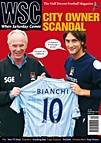 Update on clubs in crisis, Tom Davies reports
Update on clubs in crisis, Tom Davies reports
It has been another fraught summer at Queens Park Rangers, with the club facing a winding-up order, further loan entanglements and worries about ongoing financing. QPR were served with a winding-up order in June over debts of £700,000-£800,000 to HM Revenue and Customs. The club was bailed out with the help of a new £1.3 million loan from the mysterious Panama-based ABC corporation, to whom Rangers were already paying back an earlier £10m loan (see WSC 230). Furthermore, the entire loan repayment deadline was brought forward to August next year from the original deadline of 2012.
Any default on that loan could result in ABC taking control of Loftus Road and, with chairman Gianni Paladini looking to leave and the identity of potential investors unknown, these are uncertain times. In a recent letter to fans’ trust QPR 1st, Rangers director Nick de Marco insisted there was the “a serious prospect of attracting new investment”, which would free them from the grip of the ABC loans, but fans wait to be convinced.
“The board appear to have no financial plan other than to hope that a multi-millionaire investor comes along and throws us a lifeline,” a QPR 1st statement said. “We are reassured that the board is on the brink of securing investment, but with supporters in the dark about who the investor might be or what conditions the investment is dependent on, could it be a case of ‘out of the frying pan’?”
Several years of lurching from crisis to crisis finally did for Scarborough earlier in the summer, when the former Football League club was wound up with debts of around £2.5m, but supporters have set up a new club in its wake and have begun the slow climb back. The end for the old club came in June after the High Court ruled that a rescue was unlikely in the face of crippling debts. Boro’s board had hoped Scarborough Borough Council would lift a covenant preserving the McCain Stadium for sporting use, so that it could be sold to meet losses and finance a new ground, but the council was unconvinced that this would raise enough cash.
Supporters moved quickly, the Seadog Trust establishing Scarborough Athletic, arranging a groundshare with nearby Bridlington Town and securing membership of the Northern Counties East League (ahead of an attempt by Boro chairman Ian Scobbie to register a new club himself, which would have scuppered the trust’s plans).
So far so good, but the new club need to get back to Scarborough quickly. Central to that is a resolution of the McCain Stadium situation. The intentions of the local authority and the liquidator, Begbies Traynor, are likely to be clarified later this month. At issue is whether the liquidator seeks the lifting of the covenant. If it does, the ground is more likely to be sold to the highest bidder. If not, and the council takes ownership of the ground, then senior football’s swift return to the town looks much more likely.
“We could survive two seasons away from Scarborough, if we had plans to come back,” says Athletic’s chairman Simon Cope, “but if we’re playing away for a longer period the support will begin to dwindle and we could also have problems satisfying the league.”
Another famous non-League name to bite the dust this summer has been the original Enfield FC, from whom the supporter‑run Enfield Town broke away six years ago when the sale of the Southbury Road ground drove the old club out of the borough. While Town – still based in Enfield at Brimsdown – have made steady, unspectacular progress through the pyramid (they’re currently in Ryman League Division One North), the other club slid into peril, exiled in Ware and in administration for the past three years.
A new club, Enfield (1893) FC, have been set up under the leadership of the old club’s last chairman Steve Whittington and will play in the Essex Senior League, but Enfield Town have mooted the idea of merging, arguing that the area isn’t big enough to support two similarly named clubs, especially given that most Enfield supporters threw their lot in with Town when the breakaway club formed. Enfield (1893) say they are interested in closer links with Town (particularly over the possible renovation of the nearby Queen Elizabeth II ground) but have shunned a merger.
A possible breakthrough up the road at Barnet, where a long overdue thawing of relations between the League Two club and their local authority has resulted in a £3m planning application to bring the club’s Underhill ground up to scratch; failure to have done so this season could have resulted in the Bees’ expulsion from the League. The proposals include new stands and offices as well as the purchase of homes behind the ground, at a cost of £4m. While the costs of developing a viable ground are still daunting, even with Football Foundation assistance, an end to one of the most protracted club v council stand-offs could be on the card.X
From WSC 247 September 2007